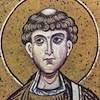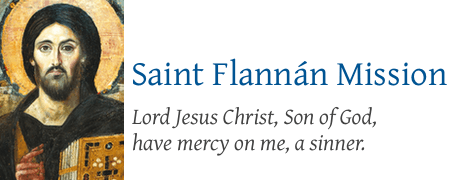 In the Name of the Father and of the Son and of the Holy Spirit, one God. Amen. Dear beloved, we remember a father among the saints, St Laurence the Archdeacon, who was martyred with the saint Pope Sixtus, along with Saints Felicissimus and Agapitus, deacons and others. The holy saints Laurence, Sixtus, Felicissmus and Apapitus and many others, pray for us.
In the Name of the Father and of the Son and of the Holy Spirit, one God. Amen. Dear beloved, we remember a father among the saints, St Laurence the Archdeacon, who was martyred with the saint Pope Sixtus, along with Saints Felicissimus and Agapitus, deacons and others. The holy saints Laurence, Sixtus, Felicissmus and Apapitus and many others, pray for us.
What is life? What is death?
The Church is populated with great saints old and new, and many were martyrs who gloriously died for their steadfast faith in God.
In the 3rd century under the emperor Valerian, Pope Sixtus of Rome was persecuted and arrested with his deacons Felicissimus and Agapitus. When Saint Laurence the Archdeacon visited St Sixtus in prison, he too wanted to die with him together for their faith in God. But St Sixtus told St Laurence, “I am already old and death is near, but you will face greater trials. Do not join us, but go to the treasury and distribute it to the poor and needy faithful.” St Laurence obediently did as the bishop said. The pope and his deacons were executed while St Laurence was arrested and tortured because the officials thought there were treasures to be uncovered. St Laurence was eventually put in a cage and burned to death. The saint, when dying, said, “I thank you Lord Jesus Christ, that You have found me worthy to enter into Your Gates.”
Too often, we cling on to life and fear death, but in the deep recesses of our minds, we know that death is certain and death comes to all. Many will attempt to retard or even hope to eradicate death through science, medicine or even the esoteric, but we know going through those routes are futile. Death comes to all.
We who place our complete faith in God, understands that we are to be dead to the world, so that we receive everlasting life through our Lord and Savior, Jesus Christ. What do we mean by being dead to the world? It is a struggling journey of us placing our trust, our burdens, our pains, our prayers, with utmost humility and repentance to our Lord, so that we can shake off the passions which we inflict upon ourselves, such as greed, lust, anger, and so on. It is the shedding of the old clothes of sin and passions, and the clarifying of our beings, such that the closer we attempt to walk towards God, the less burdened of our own afflictions we become, and eventually, through His mercy upon our undeserving selves, an entry in the Book of Life (Daniel 12:1-3).
Truly, as we reflect on 1 Corinthians 15:55 and Psalm 23 (LXX 22), death holds nothing on us, and cannot inflict pain or sting upon us, if we look only upon God as our center, our foundation, our hope, our repentance, and our prayers. God leaves many signs for us along our struggling journeys if we walk towards Him. Those signs would often be subtle, and it demands us to be listening intently, to quieten our lives, to be able to discern His calling through these very subtle signs.
This was so beautifully articulated by a monk, Fr Serapion from Mount Athos in an interview with the 60 Minutes TV program in April 2011, that we are to prepare for death with joy, to work towards our journey to the Kingdom of God. Preparing for eternal life is hard work, and require our discipline, our repentance, our prayers, our everything. This calling is not restricted to holy monks and elders in monasteries, but to all of us in the world. We prepare for our journey to God, where death is merely a signpost along the way.
St John the Beloved, the Theologian, said in the Apocalypse (Revelation 2:7), that those who overcome, they will eat from the tree of life in the Paradise of God.
What do we do in this life, working towards theosis? Beloved, remember the 2 great commandments we are given by our Lord (St Matthew 22:37-40), to love God, and love one another as ourselves. Even in history, pagans could see something divine about those who followed the 2 great commandments of Christ.
In the time of Emperor Hadrian, we read of the Apology of Marcianus Aristides, from Athens (translated from Syriac, XV), on what he saw of Christians:
“… and from the widows they do not turn away their countenance: and they rescue the orphan from him who does him violence: and he who has gives to him who has not, without grudging; and when they see the stranger they bring him to their dwellings, and rejoice over him as over a true brother; for they do not call brothers those who are after the flesh, but those who are in the spirit and in God: but when one of their poor passes away from the world, and any of them sees him, then he provides for his burial according to his ability; and if they hear that any of their number is imprisoned or oppressed for the name of their Messiah, all of them provide for his needs, and if it is possible that he may be delivered, they deliver him. And if there is among them a man that is poor or needy, and they have not an abundance of necessaries, they fast two or three days that they may supply the needy with their necessary food.” and
“… And if any righteous person of their number passes away from the world they rejoice and give thanks to God, and they follow his body, as if he were moving from one place to another: and when a child is born to any one of them, they praise God, and if again it chance to die in its infancy, they praise God mightily, as for one who has passed through the world without sins. And if again they see that one of their number has died in his iniquity or in his sins, over this one they weep bitterly and sigh, as over one who is about to go to punishment.”
Therefore, ask ourselves, do we hope our names are called in the Book of Life, or if our names are missing from it? What would be our motivation in our daily living? What would inspire us every breathing moment of the day? What do we do everyday, that would open the Gates of Paradise when we joyfully embrace the eventuality of death?
Hold our Lord Jesus Christ close to us everyday. Just as the Gospel reading today on St Mark 1:29-35 reminds us, pray whenever we can, and especially, seek God in our quiet places, and call on Him, “Lord Jesus Christ, Son of God, have mercy on me, a sinner”.
Let us close by praying the thanksgiving prayer:
It is truly meet to call thee blest, the Theotokos, ever blessed and most pure, and the Mother of our God. More honorable than the Cherubim, and more glorious than the Seraphim, without corruption thou gavest birth to God the Word: True Theotokos, we magnify thee.
O virgin Theotokos, rejoice; O Mary full of grace, the Lord is with thee. Blessed art thou among women, and blessed is the fruit of thy womb, for thou hast borne the Savior of our souls, Jesus Christ our Lord. Amen.
Fr Raphael+
Readings
Daniel 12:1-3
Psalm 23 (LXX 22)
St Mark 1:29-35
2 Corinthians 7:1-10

